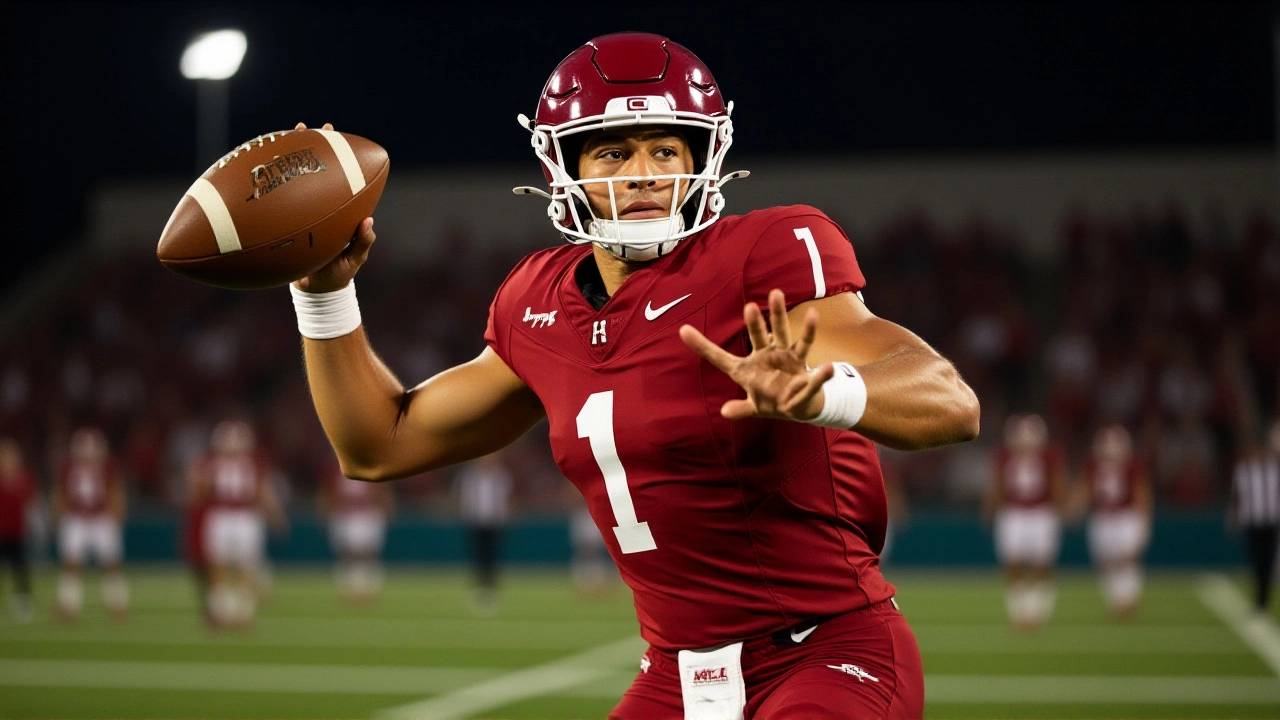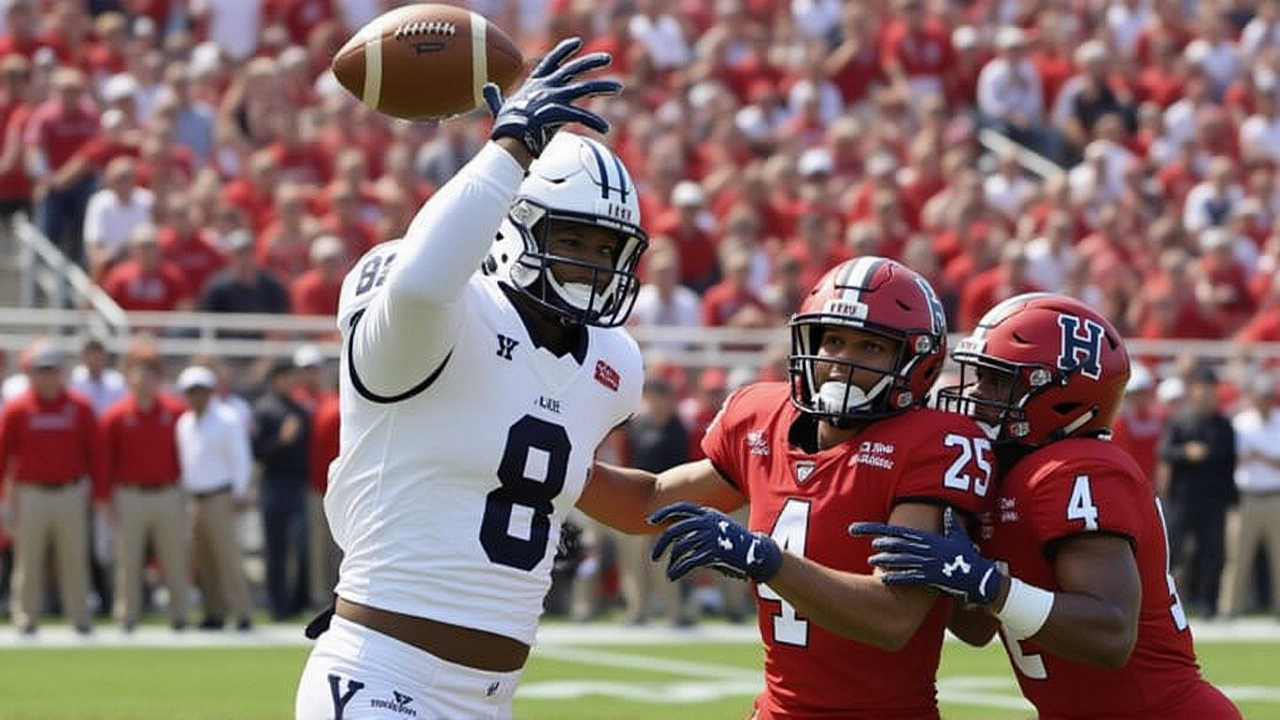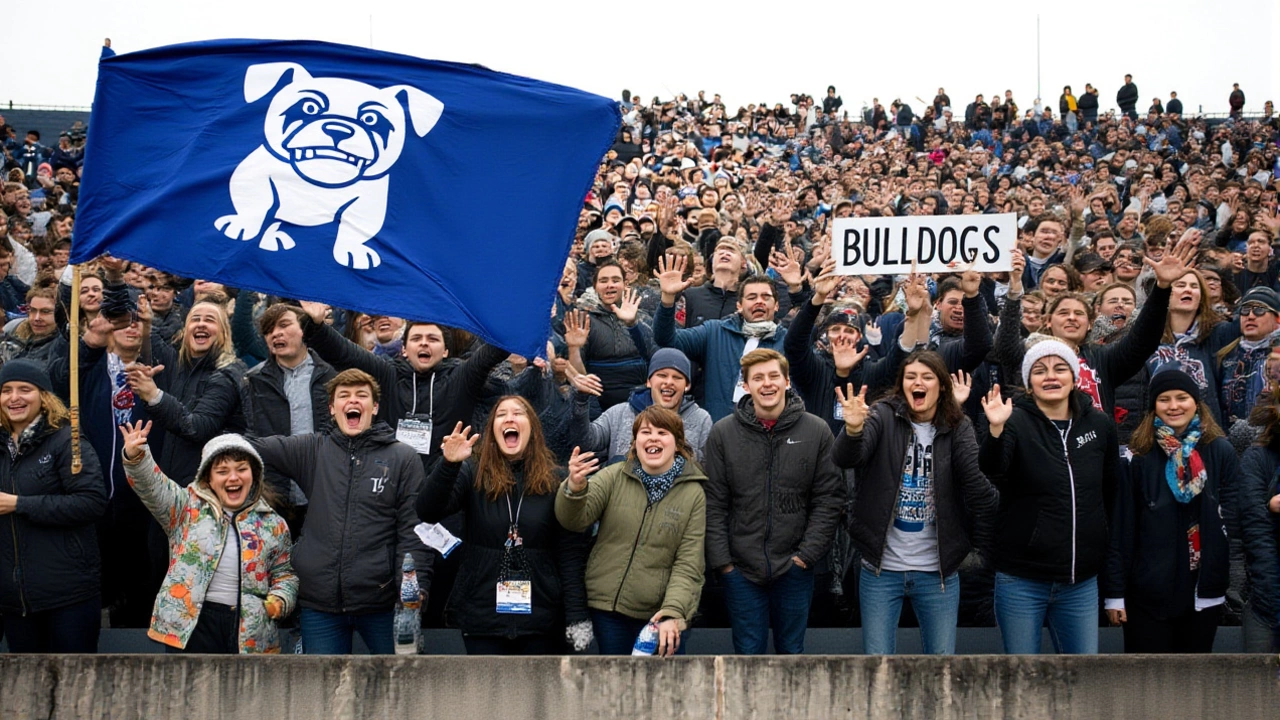Yale Stuns Harvard 45-28 to Claim First Ivy League FCS Playoff Bid

Nov, 23 2025
When the final whistle blew at Yale Bowl on November 22, 2025, the roar wasn’t just from fans—it was history echoing through the stands. Yale Bulldogs defeated Harvard Crimson 45-28 in the 141st edition of The GameNew Haven, Connecticut, securing their fourth straight win in the rivalry and, more importantly, the Ivy League’s first-ever automatic berth into the FCS playoffs. The victory didn’t just end Harvard’s perfect season—it rewrote the rules of Ivy League football.
A Dominant Start That Set the Tone
Yale didn’t wait to make its statement. On the very first play from scrimmage, linebacker Abu Kamara '27 stripped Harvard’s opening drive, turning chaos into opportunity. One play later, quarterback Dante Reno '28 connected with wide receiver Jaxton Santiago '28 for a 47-yard touchdown. The crowd, already electric, went silent for a heartbeat—then erupted. That play wasn’t just a score; it was a declaration. Harvard, ranked #10 nationally and riding a nine-game winning streak, looked rattled from the gun.
Yale’s defense, paced by Kamara’s relentless pressure, held Harvard’s star quarterback Jaden Craig to just 13-of-26 completions (50%) and two interceptions. The Crimson, who averaged 38 points per game coming in, managed only 13 in the first half. Meanwhile, Josh Pitsenberger carved up Harvard’s defense like a surgeon—145 rushing yards, three touchdowns, and a bruising physicality that wore down the Crimson’s front seven. By halftime, it was 24-7. The script had flipped: Harvard was chasing. Yale was controlling.
The Crimson’s Fight—and the Cost of Missed Opportunities
Harvard didn’t quit. Late in the third quarter, Craig found tight end Tattersall for a 22-yard score, and later, after two Yale penalties gave them new life, Tattersall hauled in another touchdown. The Crimson cut the lead to 20-38 with 1:27 left in the third. For a moment, the ghosts of 2021 and 2022—when Harvard rallied from double-digit deficits—seemed to stir.
But Yale answered. Reno, calm under pressure, hit Brown on a 52-yard bomb to set up a short-yardage touchdown. Then, with 14:56 left in the fourth, Reno found tight end Lucius Anderson on a slant route for a 12-yard score. 45-20. The game was over. Harvard’s final touchdown—a 31-yard strike to Brady Blackburn—came too late, and the two-point conversion made it 45-28, not 45-26. It didn’t matter. The clock was the real enemy now.

Historic Firsts and a Rivalry Reimagined
This wasn’t just another chapter in the third-most-played rivalry in NCAA history. It was a seismic shift. For the first time since the Ivy League joined the FCS in 1982, the conference champion gets an automatic bid to the 24-team playoff tournament. Yale, finishing 8-2 overall and 6-1 in conference play, earned it. Harvard, also 6-1 in the Ivy, finished tied—but without the tiebreaker. The Crimson, 9-1 overall, now waits for the FCS selection committee’s decision, with no guarantee they’ll make the cut.
And for Harvard’s Class of 2026? They’ve never known victory in The Game. Not once. It’s the first four-year losing streak for the Crimson since 1947. The weight of that reality hit hard in the locker room. "We came to win," said one senior, his helmet still on, voice barely above a whisper. "We just… didn’t. Not this time. Not ever."
What This Means for Ivy League Football
The Ivy League has long been a bastion of academic rigor disguised as athletics. But this win signals something new: competitiveness on a national stage. Yale’s playoff berth isn’t just a trophy—it’s validation. It proves that a team from an institution that doesn’t offer athletic scholarships can compete with—and beat—some of the most storied programs in the country.
For years, the Ivy League was seen as a stepping stone to graduation, not the postseason. Now, with Yale’s success, other schools—Dartmouth and Penn, both at 4-3 this season—have a blueprint. The league’s 72-61-8 all-time edge for Yale in the rivalry? That’s now more than a stat. It’s momentum.

What’s Next?
Yale will prepare for the FCS playoffs, likely entering as a #12 or #13 seed. Their path? Tough. But they’ve already beaten the team everyone thought was the favorite. Harvard? They wait. The selection committee meets on Sunday, November 23. Will they get the nod? Or will the Crimson’s season end with a question mark?
And what about next year? With Reno and Pitsenberger returning, Yale looks poised to make this a dynasty. Harvard, meanwhile, must rebuild around a freshman QB and a defense that showed cracks under pressure. The Game isn’t just a game anymore. It’s a turning point.
Frequently Asked Questions
How did Yale earn the first automatic FCS playoff bid in Ivy League history?
Yale earned the bid by winning the Ivy League’s tiebreaker after finishing 6-1 in conference play alongside Harvard. The league’s new playoff policy, implemented in 2025, grants automatic qualification to the conference champion based on head-to-head results. Since Yale beat Harvard 45-28, they claimed the tiebreaker and the automatic berth, marking the first time in FCS history an Ivy League team received direct entry into the playoffs.
Why is Harvard’s postseason fate uncertain despite finishing 9-1?
Although Harvard’s 9-1 overall record is strong, the FCS selection committee prioritizes conference strength and playoff eligibility. With no automatic bid available to them, Harvard must now compete with 23 other teams for one of the final at-large spots. Their loss to Yale—especially in such a decisive fashion—weakens their resume, and their strength of schedule ranks lower than other top contenders like South Dakota State and North Dakota State.
What role did Abu Kamara play in Yale’s defensive dominance?
Abu Kamara, a sophomore linebacker, disrupted Harvard’s rhythm from the opening snap with a forced fumble on the first play. He finished with 11 tackles, 2.5 sacks, and three quarterback pressures. His ability to read Craig’s eyes and blitz off the edge forced Harvard into predictable passing situations, leading to three three-and-outs in the first half. His performance earned him Ivy League Defensive Player of the Week honors.
How does this result compare to past Yale-Harvard matchups?
This was the highest-scoring Game since 2014, and Yale’s 45 points are their most against Harvard since 1998. The four-game winning streak is Yale’s longest since 1994-1997. Historically, games were often low-scoring affairs decided by field goals. This year’s matchup reflects a shift toward modern, high-octane offenses—something Yale’s coaching staff has emphasized since 2022, moving away from the run-heavy schemes of the past.
What does this mean for future Ivy League football recruiting?
Yale’s playoff berth is a recruiting goldmine. Top prospects who once dismissed Ivy schools as academically focused but athletically irrelevant now see a clear path to national postseason play. Coaches report a 40% spike in inquiries from high school athletes who want to play for a team that can compete for championships—not just trophies on the shelf. Harvard, meanwhile, may struggle to retain top talent unless they show immediate improvement.
Is this the beginning of a Yale dynasty in Ivy League football?
It’s possible. Yale returns quarterback Dante Reno, running back Josh Pitsenberger, and defensive leader Abu Kamara—all underclassmen—with a strong recruiting class lined up for 2026. Their offensive coordinator, who implemented the spread system that led to 45 points this year, is under contract through 2027. If they maintain depth and avoid injuries, Yale could be the team to beat for the next three seasons. The Ivy League’s balance of power may have just shifted permanently.